Lord of the flies (William Golding)
- Fiche de cours
- Quiz et exercices
- Vidéos et podcasts
Découvrir la critique que Golding fait de la nature humaine, de la société et du pouvoir dans son livre.
- L’auteur britannique Sir William Gerald Golding écrit Sa Majesté des mouches en 1954.
- Le roman parle d’un groupe de garçons qui, après avoir survécu au crash de leur avion dans l’Océan Pacifique, recréent une petite société sur une ile déserte.
- La soif de pouvoir, la paresse, la peur et la violence ne tarde pas à déchirer le groupe.
- Le roman tire son titre d’une tête de cochon mort grouillante de mouches, avec laquelle l’un des enfants, Simon, imagine qu’il discute.
Lord of the Flies was written in 1954 by Sir William Gerald Golding, a British novelist, playwright and poet who received the Nobel Prize in literature in 1983. It tells the story of a group of teenagers surviving on an island after their plane has crashed in the Pacific Ocean. The story takes place in the middle of a war, though we do not know which one (probably a war imagined by the writer). Though Golding’s novel sold few copies in the beginning, it is now ranked as one of the best English-language novel ever written.
Once isolated on a deserted island far from home, the children try to recreate a type of society. They choose a ruler, Ralph, but soon jealousy appears and another boy, Jack, wishes to be the leader. He will rule over a group of hunters while Ralph will be the chief of the other boys. A type of democracy is established and anyone, the biguns (older boys) as well as the littluns (younger boys), can summon the assembly providing he uses a conch, then a pair of glasses as it is the only means they have of lighting a fire.
To survive, they have to hunt and work, but soon, most of the boys prefer having fun and idleness replaces common sense. One of its consequences is that they forget to keep a fire lit to warn of their presence. Ralph gets angry with his troop when he sees in the distance a ship that could have rescued them, had they seen the smoke signal.
Later, things get worse when some boys fear the presence of a beast on the island. To reassure them, Jack and his hunters promise to find it, should it exist. They decide to offer it a pig’s head and kill it when it comes nearby. While they are searching the island, twin brothers Sam and Eric believe they have seen the beast and return to the camp to tell the news. But what they mistook for the monster was in fact the corpse and the parachute of a dead pilot whose plane was destroyed in an aerial battle.
In the meantime Simon, a quiet dreamy boy, starts an imaginary dialogue with the pig’s head swarming with flies, which explains to him that they are the real beasts. The lord of the flies also tells Simon that he is in danger and that the other boys are going to kill him. Before returning to the camp, Simon discovers the dead parachutist and runs away from the scene to tell the news. When he gets to the camp, the other boys attack him and kill him, thinking he was the beast!
In the following days, Ralph’s authority is rejected as Jack wants to become the chief. Both engage in a battle and Ralph, soon outnumbered, has to flee. He heads for a forest, but Jack sets fire to it. Ralph’s chances of survival are thinning but, as he is about to be captured, he meets a British officer who has landed nearby after seeing the flames ravaging the island. The soldier is disappointed by the children adopting warlike attitudes.
William Golding’s first novel is very interesting in the sense that it tackled a lot of themes, often opposing them: moral and immoral attitudes, individuals within a group, friendship and hatred, violence on a paradisiacal island… But what he tried to explain was that nobody, adult or child, can be good once the will to power is at stake, as the lord of the flies told Simon. Friends soon become enemies and violence takes precedence on everything else. Golding explains that we cannot escape it, it is part of human nature.
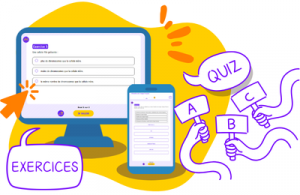
Des quiz et exercices pour mieux assimiler sa leçon
La plateforme de soutien scolaire en ligne myMaxicours propose des quiz et exercices en accompagnement de chaque fiche de cours. Les exercices permettent de vérifier si la leçon est bien comprise ou s’il reste encore des notions à revoir.
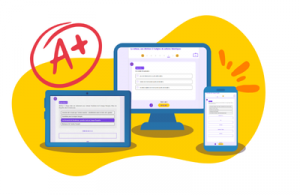
Des exercices variés pour ne pas s’ennuyer
Les exercices se déclinent sous toutes leurs formes sur myMaxicours ! Selon la matière et la classe étudiées, retrouvez des dictées, des mots à relier ou encore des phrases à compléter, mais aussi des textes à trous et bien d’autres formats !
Dans les classes de primaire, l’accent est mis sur des exercices illustrés très ludiques pour motiver les plus jeunes.

Des quiz pour une évaluation en direct
Les quiz et exercices permettent d’avoir un retour immédiat sur la bonne compréhension du cours. Une fois toutes les réponses communiquées, le résultat s’affiche à l’écran et permet à l’élève de se situer immédiatement.
myMaxicours offre des solutions efficaces de révision grâce aux fiches de cours et aux exercices associés. L’élève se rassure pour le prochain examen en testant ses connaissances au préalable.
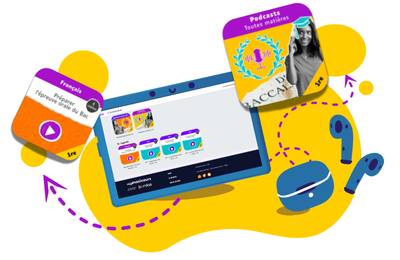
Des vidéos et des podcasts pour apprendre différemment
Certains élèves ont une mémoire visuelle quand d’autres ont plutôt une mémoire auditive. myMaxicours s’adapte à tous les enfants et adolescents pour leur proposer un apprentissage serein et efficace.
Découvrez de nombreuses vidéos et podcasts en complément des fiches de cours et des exercices pour une année scolaire au top !
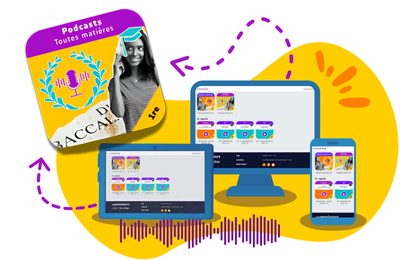
Des podcasts pour les révisions
La plateforme de soutien scolaire en ligne myMaxicours propose des podcasts de révision pour toutes les classes à examen : troisième, première et terminale.
Les ados peuvent écouter les différents cours afin de mieux les mémoriser en préparation de leurs examens. Des fiches de cours de différentes matières sont disponibles en podcasts ainsi qu’une préparation au grand oral avec de nombreux conseils pratiques.
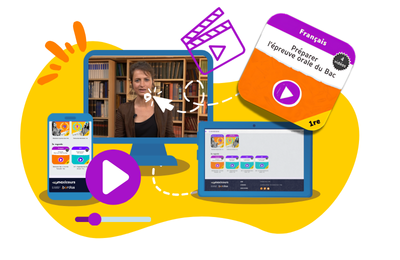
Des vidéos de cours pour comprendre en image
Des vidéos de cours illustrent les notions principales à retenir et complètent les fiches de cours. De quoi réviser sa prochaine évaluation ou son prochain examen en toute confiance !








